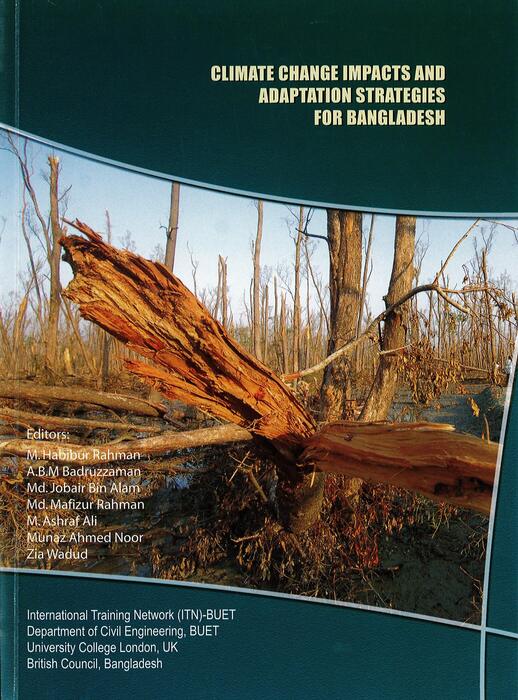Climate Change Impacts and Adaptation Strategies for Bangladesh

Category(s): Books & Proceedings
Language: English
The global issue of climate change encompasses significant challenges to the survival of all living entities on earth. Global warming and its consequent effect of climate change are attributed directly or indirectly to human activities that alter the global atmosphere’s composition. The scenario is compounded by ignorance of environmental issues in economic development. Despite contributing insignificantly to causes of climate change, developing countries are expected to be the worst victim. Due to its geographical location, Bangladesh is one of the most disaster-prone countries in the world and due to adverse impact of climate change natural calamities are predicted to be even more intense and frequent in the coming years.
Demographic and socio-economic condition of the country makes the situation more precarious.
Poverty alleviation is the highest priority issue in development policies and strategies of Bangladesh. Climate change has the potential to jeopardize our achievements in recent years in poverty reduction. Increases in droughts, floods, cyclones and other extreme events would add to stresses on water resources, agricultural production, human health, energy and infrastructures. Yields of important crops are projected to decrease due to temperature variability, changing pattern of rainfall, rise of sea level and saline intrusion in agricultural land, which would subsequently result in food and water insecurity. According to IPCC prediction, by the end of the century 29,846 km2 area of land will be lost in Bangladesh and 14.8 million people will be landless due to sea level rise.
Climate change is not only an environmental but also has become a development issue. In accordance with Bali Action Plan, the country has formulated coping strategy in the form of ‘Bangladesh Climate Change Strategy and Action Plan’ in 2008. Fund for Climate Change has also been created in the budget of current fiscal year to stimulate adaptation activities. However, with local resources and technology it would be a formidable challenge to implement the plans. The government should strongly negotiate with the developed countries to ensure the flow of necessary financial and technological support to strengthen the local effort. It is encouraging that many development partners and agencies have committed us to contribute in this fund. Optimum utilization of these resources, considering cost-effectiveness and sustainability, is the present challenge for the decision-makers and technologists. The International Conference on Climate Change Impact and Adaptation Strategies for Bangladesh (Climate 2009) has been organized to provide directives in this regard.
This book is a compilation of articles on the issue of climate change selected from papers presented at the Conference. It focuses on the identification of the possible implication of climate change on environment and economic development of Bangladesh and devising sustainable development framework. The editors hope that the book will contribute in understanding the adverse impact of climate change and development and dealing with the challenges.
Keywords
Climate Change, Adaptation Strategies
Copyright
This is an open access work distributed under the terms of the Creative Commons Attribution License, which permits unrestricted use, distribution, and reproduction in any medium, provided the original work is properly cited.
No comment yet.